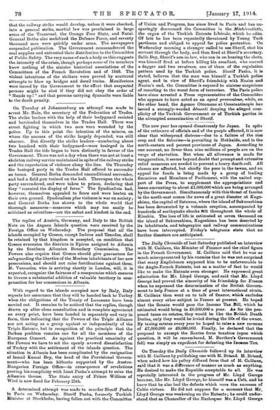On Tuesday at Johannesburg an attempt was made to arrest
Mr. Bain, the secretary of the Federation of Trades. The strike leaders with the help of their bodyguard resisted and barricaded themselves in the Trades Hall. There was street fighting in which two men were wounded by the police. Up to this point the intention of the miners, on whom the success of the strike largely depended, was still obscure. But directly the strike leaders—numbering about two hundred with their bodyguard—were besieged in the Trades Hall the tide began to turn distinctly in favour of the Government. There was not a day when there was not at least a !skeleton railway service maintained in spite of the railway strike and the expectation of violence along the line. On Thursday the besieged party in the Trades Hall offered to surrender on terms. General Botha demanded unconditional surrender, and had a field gun trained on the hall. Thereupon the whole party surrendered, and were taken to prison, declaring that they "resented the display of force." The Syndicalists bad, however, themselves appealed to force and were beaten on their own ground. Syndicalism plus violence is war on society ; and General Botha has shown to the whole world that thorough measures—measures which may too easily be criticised as relentless—are the safest and kindest in the end.










































 Previous page
Previous page